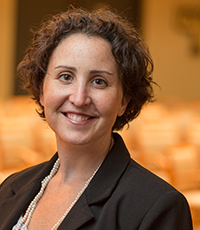Kaethe Morris Hoffer, Executive Director of CAASE (Chicago Alliance Against Sexual Exploitation) does the following exercise with groups: Think back to a recent walk in a public space. Imagine someone, anyone, you passed on your way. Now, how much money would it take for you to perform a sex act with, on, or to this person? For many who hear this question, they are startled, shocked by the mere idea of such a thing. Responses like, there is no amount of the money in the world or some exorbitant amount of money with several zeroes at the end or something like I cannot even fathom the scenario…For many, performing sex acts, multiple–as in fifteen, twenty, or more–in one night for a pittance–as in $20, $50, $100 with strange, random men is a way of life. It is a way of life for some by choice, Sex Workers. And for millions in the world, known as victims of human trafficking, as a result of force, fraud, or coercion.
In this week’s Torah portion, Terumah, the Israelites are charged with building the Mishkan or tabernacle, which will serve as a dwelling place for God. God says, “They should make me a sanctuary so I may dwell amongst them” (Exodus 25:8). Such an amazing verse of Torah because God does not say, build the Mishkan so I may dwell in IT but rather so I may dwell in THEM–the people. God lives in us, or can.
If you felt that the scenario above was impossible, imagine what it takes, the degradation of your humanity you would have to endure, to move from a resounding, stomach-turning no! to yes…for a gut-wrenchingly small fee. Something heinous has to happen to a person to move from being a person in whom God can reside to an objectified being that feels so desperately without Godliness.
For several years, I have been engaged in anti-human trafficking work. I have learned many lessons about how white, middle, and upper-middle class men–usually married and usually with children–make up the majority of buyers of sex. Or how the FBI estimates that the age of entry into prostitution for children is as young as 121. Or how the International Labor Organization (ILO) estimates that there are 5.5 million child victims of trafficking worldwide, 1.8 million or more of whom are victims of sex trafficking2. In the US, trafficking has been identified in every single state, including yours. But Terumah has an additional lesson to teach in how to respond to an injustice built upon the degradation and objectification of a human being.
We read in Exodus 25:2 how God tells Moses to tell the people “to have them take for Me an offering from each person whose heart inspires them to generosity.” One who gives generously with their heart is called a nadiv lev. Being a nadiv lev is not something done when fulfilling an obligation. Acts of tzedakah or righteousness, fighting injustice–this is a mitzvah, a commandment, something we are required or compelled to do. The generous heart is a gift of love; it is something beyond. It is being open and vulnerable in the face of such deep pain and suffering that the human being is almost gone. Only through the generous heart, the loving heart, the giving, compassionate heart can Mishkan, a Sanctuary, be built where God, where humanity, where dignity may begin to dwell.
1FBI: http://www.justice.gov/oig/reports/FBI/a0908/chapter4.htm. But see also this analysis from Politifact. Children are also trafficked into industries such as agriculture, street vending, domestic labor, and factory work.
2http://www.unicefusa.org/sites/default/files/end%20traffickign%20one%20pager_0.pdf and I.L.O. “Commercial Sexual Exploitation of Children and Adolescents: The I.L.O.’s Response“.
Rabbi Rachael Bregman is the rabbi of Temple Beth Tefilloh in Brunswick, GA, and a T’ruah board member.

